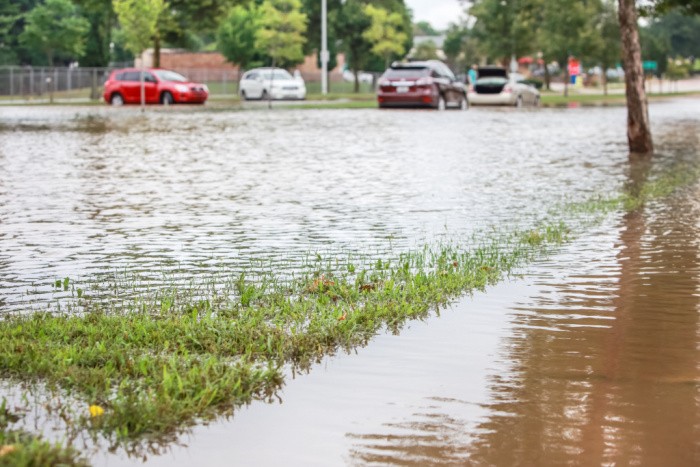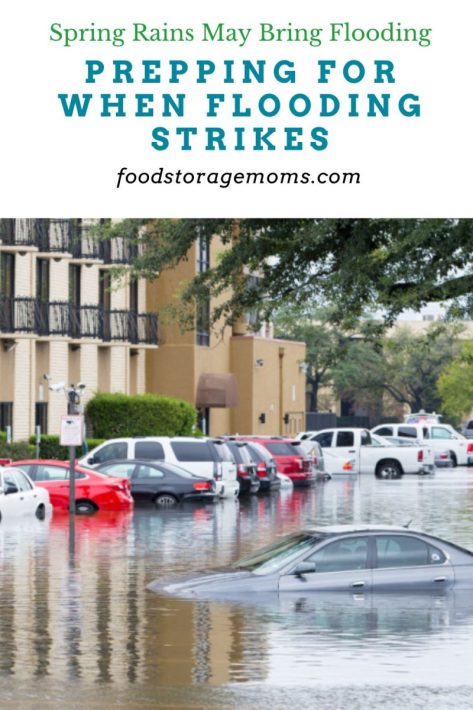
Preparing for natural disasters is so critical because they seem to be happening more frequently and with greater intensity worldwide. You don’t necessarily have to be one of those people preparing for the end of days, but preparing your home and your family for a scenario such as a flood is a great idea. Let’s talk about prepping for when flooding strikes! In case you missed this post, 12 Types of Natural Disasters
That’s because floods don’t typically give you much time to prepare, and many unfortunate people decide to wait until the last minute and then try to get up to speed. Maybe you don’t live in a part of the country that experiences flooding too often, but this information could still be of importance to you, especially if your area were ever to be blindsided by a freak storm. Here’s more on prepping for when flooding strikes.
It may seem strange to stress the need for flood preparedness, particularly here in the West where we’ve had years of drought. Most of the western states have had a great water year with above-normal snowpack. If we have an unusually warm spring, the runoff could create some flood risk and flood waters may be an issue. Flood damage to your home and property can be difficult to deal with on your own, so let’s do all we can to minimize the chance of expensive and dangerous floods.

Have a Plan Already In Place
Get an emergency plan put together so you know where you’ll go if you’re ever given evacuation orders to leave your home. Whether it’s a family or friend’s house that’s an hour or two away, you’ll want to know the evacuation routes. Have more than one route laid out once you decide it’s the place where you should go. You may need to seek protection at your local shelter until it’s safe to evacuate.
Your family may also be in different places when a flood strikes, so make sure that you discuss with everyone where you will rendezvous under different scenarios of work, school, home, etc.
You’ll need to plan several escape routes for your vehicle in case the main roadway becomes blocked by traffic, flash floods, or debris. You want to get your family to higher ground above flood elevation as quickly as possible to escape those risks.
Preparing Your Home for a Flood
If you have time to do so, there are several things that you need to do around your home to prepare for a flood:
- First off, make sure that your gutters and downspouts are clear of leaves and debris so that they can move the rainwater away from your home.
- Remove low-hanging branches hovering near your home and trim your bushes. Unplug your appliances and set them on cement blocks if possible if home flooding is imminent. That would include your water heater, washer and dryer, furnace, freezer, and refrigerator. Make sure basement drains are clear.
- Many homeowners place sandbags and other barriers around their homes to redirect floodwaters and keep them safe when a flood threatens. While you may be spending more on this one, think of the thousands of dollars you could save in your home. You could also try filling trash bags (they may tear) with sand to help stop your home from flooding. Sometimes, your city will hand 25 bags to each homeowner or renter.
- If you get a flood warning from agencies like the National Weather Service, you must also unplug everything electrical. Then take these things TVs, computers, monitors, sound systems, and move them to the highest point in your home to keep them from being water-damaged. Also, move any of your valuables and furniture upstairs to the highest point in your home.
- If you have any fuel or water tanks in the garage, find some way to tie or chain them down.
- Another thing that you need to consider long before any flooding is to get your home covered by flood insurance. Regular homeowners insurance doesn’t cover “acts of God.” Your area may qualify for National Flood Insurance Program coverage for your flood insurance needs. Typically, there is a two-week waiting period before flood insurance policies will take effect; please check with your insurance agent.
- It may be prudent to totally turn off the utilities to your home. Learn where the main power switch is in your electric panel. Also, know where the main gas valve is for your natural gas or heating oil. You’ll probably need the gas company to come and turn things back on, but that’s ok if you protected your home.
Flood Supplies You Will Need
Sump Pump
If your home does take in floodwater you’re going to need a method to remove water from your basement. Get yourself a sump pump for your home that has a battery-powered backup in case you’re also dealing with power outages.
Drinking-Water and Water Filter
When flooding happens in your area, it may not be bad enough that you have to evacuate your home. But you could be dealing with contaminated tap water along with a power outage and no safe way of getting to the grocery store.
Plan on storing enough bottled water or gallons of water in larger containers for everyone in your family for at least three days. On average, you will need four gallons of water per person per day, so plan accordingly. Groups like FEMA and the American Red Cross have suggested a minimum of one gallon of water per person per day. I don’t see how you can stay hydrated, do some cooking, perform minimal personal hygiene, and do limited laundry with so little water.
Some people even fill up their bathtubs and sinks with drinking water and then use a portable water filter to purify their water. I like the water filter systems from Big Berkey and PortaWell. Check them out if you want a reliable long-term solution for backup water in your home. One of my favorite ways to store water is in WaterBricks.
Food
It’s a great idea to have a fully stocked emergency pantry already in place so that your family has something to fall back on. Non-perishable food items are shelf-stable for long periods of time, so I’d encourage you to go this route and have enough for at least 72 hours.
Remember to pack energy-boosting snacks like protein bars, beef sticks, and jerky. There’s also a good chance you won’t be able to cook if the power goes out, so plan on foods that don’t require cooking.
Flashlights
Store several flashlights with enough extra batteries to see your way around in the dark. Please have some with batteries and some that use solar. Flash Lights and Solar Flashlights
Weather Radio
You’re going to need updates on the weather and any changes that may be happening. Get yourself a NOAA weather radio that is solar-powered or is hand-cranked to receive vital information. You will also need 2-way radios for your family if one of you has to separate from the rest of the group. Weather NOAA Radio
Warm Blankets and Clothing
Be sure to have plenty of warm blankets and extra clothing ready for each of your family members. Don’t forget socks and underwear. In case you missed this post, 6 Reasons To Store Blankets For Any Emergency
Rain Gear
There are not many things in life that are more miserable than sitting in cold, sopping-wet clothing. Don’t forget to pack rain gear for everyone in case you have to venture outside.
Non-Electric Heater
When you are planning to hunker down in your home while waiting out the flood, you will need some way of staying warm. Get yourself a non-electric heater like a propane heater to do the trick. Be careful because most propane heaters must be used outdoors. How To Heat Your Home In An Emergency
Evacuation Bag
There’s always the possibility that you may have to evacuate your home, so you will need to have gathered enough supplies and essentials ahead of time and set aside if you need to leave in a hurry.
Protect Your Documents
Get yourself a water/fireproof chest that you can store all your important documents, computer memory cards, and smaller valuables that you don’t want to be misplaced. Gather your marriage certificate, birth certificates, insurance information, and other documents that you don’t want to lose. In case you missed my post, Emergency Binder
When You’re Forced to Evacuate…
If the situation becomes life-threatening and you have to evacuate your home, don’t hesitate and get out quickly. But if you still have enough time before you have to leave, make sure that you turn off your electricity, water, and gas to your home to minimize the damage to your home and related appliances and equipment.
Final Word
Flooding is something that should never be taken lightly. They not only cause major damage to homes and entire communities, but they’ve been known to take many lives as well. With these prepping tips, you’ll be able to not only minimize your home’s damage, but also keep your family safer, which should be your main concern. What tips would you consider for prepping for when flooding strikes? God Bless this world, Linda
Copyright Images: Stormwater Flooding AdobeStock_225446419 by Soupstock, Flooding in Houston Texas AdobeStock_217277618 By By Michelmond
The post Prepping for When Flooding Strikes appeared first on Food Storage Moms.
